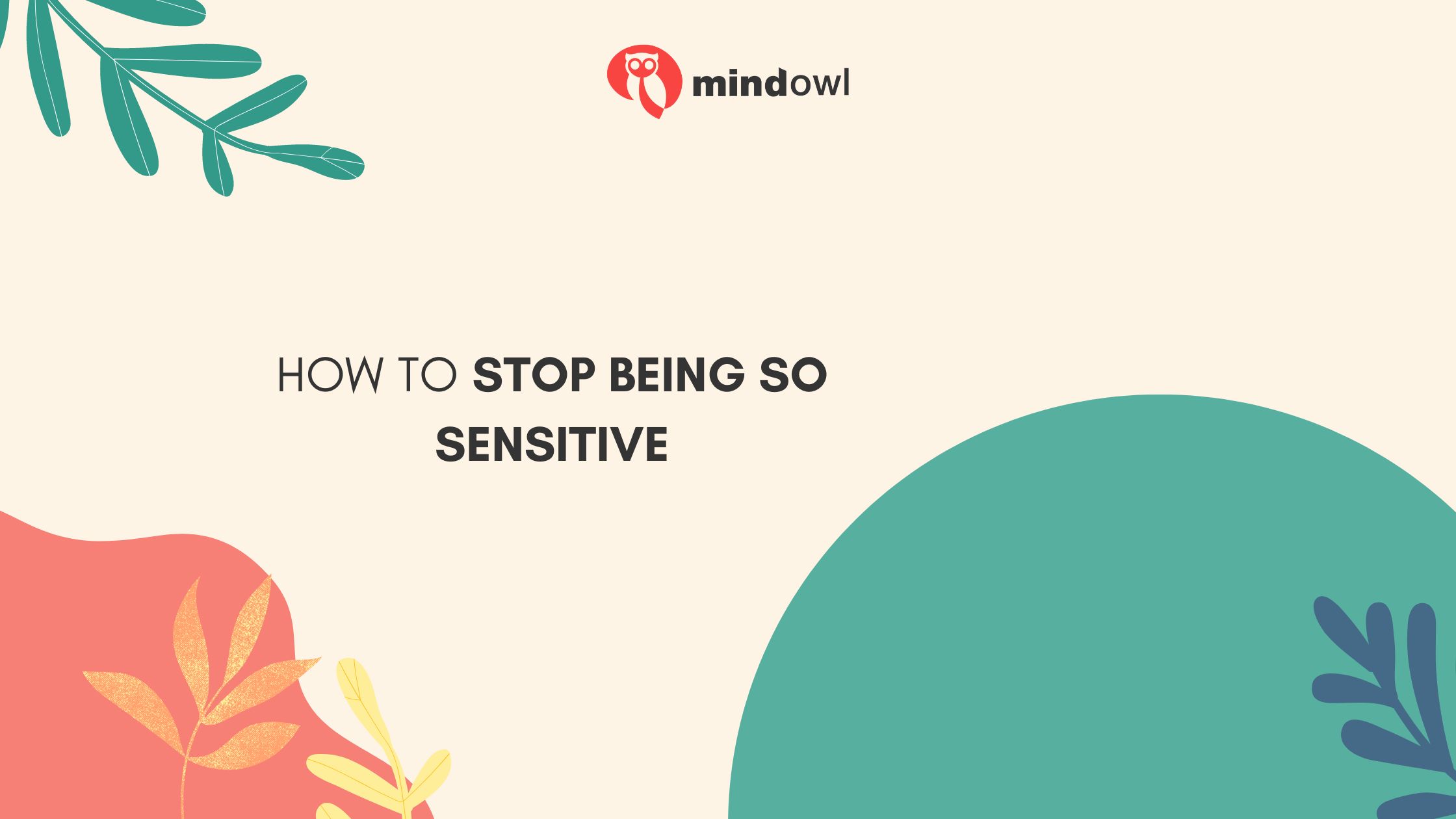
Feeling overwhelmed by emotions in certain situations can be exhausting. It is estimated that one in five people are naturally more sensitive than others, but this doesn’t mean we have to let our feelings run riot.
This article will equip you with a toolkit of techniques and strategies to cope better in intense scenarios and not feel ruled by your sensitivities. Let’s navigate on this empowering journey together!
Key Takeaways
- Sensitivity is a personality trait, not a disorder. It’s important to recognize and embrace this aspect of yourself.
- Remember that other people’s feelings may not always be about you. Developing empathy and seeing things from their perspective can help in social situations.
- Learn mindfulness and self – awareness techniques to better cope with intense emotions and become more balanced.
- Use displacement techniques, such as drawing or playing sports, to redirect strong emotions in healthy ways.
- Gain perspective by understanding how others feel and why they act the way they do.
- Embrace acceptance of your sensitivity as a positive attribute that allows for deeper connections with others.
- Engage in brain training exercises like memory games or physical exercise to improve cognitive abilities and emotional regulation.
- Reflect on past experiences to understand the origins of your sensitivity and identify triggers that can be desensitized over time.
Understanding Sensitivity

Recognize that sensitivity is a personality trait, not a disorder.
Recognize that sensitivity is a personality trait, not a disorder
Sensitivity is part of who you are. It’s not a disorder or something to fix. This trait makes it easy for you to pick up on little changes in your surroundings or spot when someone else feels upset.
Even though these same things can sometimes make life harder, they also come with strong points. Like being good at seeing things from all sides, or knowing how to calm a friend down when they’re sad.
Try seeing this side of your sensitivity as well – it just might help you feel better about yourself!
Realize that it’s not always about you
You need to know how other people feel too. Their feelings may not be about you. Highly sensitive people often focus on their own emotions. This can make them forget that others have feelings too.
You must realize this fact and strive to see the world through other people’s eyes.
Knowing it’s not always about you helps build better links with others. It helps in understanding what they feel or experience without tying it to your emotions. This step is key for sensitive souls seeking balance in social situations.
The right move towards proper mental health lies in grasping this truth!
Value your own approval and self-worth
You are important. Your thoughts count. Sometimes, people look for others to say good things about them. They think this makes them better or more valuable. This can be bad for relationships and how you see yourself.
It’s known as ‘contingent self-worth‘. But the truth is, you do not need other people to tell you your worth. Understanding this fact can help sensitive individuals feel stronger. You have to value who you are inside and know that your own approval matters most.
That helps make feelings of being too sensitive less strong over time.
Techniques to Manage Sensitivity

Practice mindfulness and self-awareness, redirect emotions using displacement techniques, gain perspective by jumping into others’ shoes, embrace acceptance, and engage in brain training exercises.
Practice mindfulness and self-awareness
One way to handle being super sensitive is by learning mindfulness and self-awareness.
- Start by doing simple breathing methods everyday. It is a core part of mindfulness that makes you aware of your body.
- Try guided imagery exercises. This can help you shift focus from what upsets you.
- Use relaxation practices often to promote psychological health.
- Set aside time each day to explore self – awareness. It helps you know your strengths, weaknesses, and emotional triggers.
- Begin each day with a quiet moment of reflection. This boosts your keen awareness of areas needing change.
- Be a mindful leader in life. It helps you see where improvements need to be made.
- Use mindfulness practices if noises upset you too much. These practices help manage sensitivity to sound.

Use displacement techniques to redirect emotions
Using displacement can help you manage feelings. It is a way to cope with strong emotions. People can use this in many ways.
- You might draw or paint to let out feelings.
- Some people play a sport to redirect their energy.
- Others may write in a diary about their emotions.
- You can try cleaning your home or doing yard work.
- Perhaps, play an instrument would be a good option for you.
Gain perspective by jumping into others’ shoes
Try to see things from other people’s point of view. This will give you new ideas. It helps you think in a different way. Think about how others feel and why they act the way they do.
Doing this makes it easier for you not to take things personally as well as reduce stress in hard times. You can get good at this with time and practice!
Embrace acceptance
Accepting yourself is a big step. It means saying yes to who you are, even the parts you feel bad about. Many sensitive people react strongly to things around them. They take in a lot of data from their environment.
This trait cannot be turned off as it’s mostly in your genes. But this is not a bad thing! In fact, those with high sensitivity levels often have great gifts. Accept that being touchy can be good too.
You may get hurt more easily but also love deeply. Embrace your unique traits and use them well.
Engage in brain training exercises
To further manage sensitivity, engaging in brain training exercises can be helpful. These exercises can improve cognitive abilities and emotional regulation. Here are some brain training exercises to try:
- Memory games: Play games that challenge your memory, such as card matching or word recall exercises. This can enhance your ability to remember and retain information.
- Problem-solving puzzles: Solve puzzles like crosswords, Sudoku, or logic games. These activities can sharpen your problem-solving skills and enhance your cognitive flexibility.
- Meditation and mindfulness: Practice meditation to increase focus and reduce stress. Mindfulness exercises help you stay present in the moment and improve emotional awareness.
- Reading and learning new things: Engage in reading books, articles, or websites on topics that interest you. Learning new information stimulates the brain and enhances cognitive function.
- Physical exercise: Regular physical activity has been shown to improve cognitive functions like memory recall, problem-solving, and concentration.
Building Emotional Resilience
Reflect on the origins of your sensitivity and identify triggers to work on desensitizing them. Develop coping strategies for managing emotions in the moment and utilize constructive criticism for personal growth.
Reflect on the origins of your sensitivity
Understanding the origins of your sensitivity can help you build emotional resilience. Take some time to reflect on past experiences and traumas that may have contributed to your heightened sensitivity.
By gaining awareness of these origins, you can better understand why certain situations or stimuli trigger intense emotional responses. This self-reflection allows you to develop coping strategies specific to your needs and work towards desensitizing triggers over time.
Remember, building emotional resilience is a process, so be patient with yourself as you explore the roots of your sensitivity and find ways to manage it effectively.
Being connected to your spiritual side can also strengthen emotional resilience in sensitive individuals. Engaging in practices such as meditation, prayer, or mindfulness can help you cultivate inner peace and acceptance.
Taking care of your mental health through activities like therapy or counseling can provide valuable support in this journey as well. Remember that everyone’s experience with sensitivity is unique, so finding what works for you may require some trial and error.
Identify triggers and work on desensitizing them
Triggers can cause strong emotional reactions that can make sensitive individuals feel overwhelmed. Identifying these triggers is the first step towards managing sensitivity. Here are some techniques to help work on desensitizing them:
- Reflect on your past experiences and try to understand what situations or events trigger intense emotions.
- Once you have identified your triggers, intentionally expose yourself to them in a controlled and safe environment.
- Gradually increase your exposure to these triggers over time, allowing yourself ample recovery time between exposures.
- Seek support from a therapist or coach who specializes in helping individuals desensitize their triggers.
- Practice relaxation techniques, such as deep breathing or meditation, when facing triggering situations.
Develop coping strategies for managing emotions in the moment
To manage your emotions in the moment, it’s important to develop coping strategies. These strategies can help you stay calm and handle difficult situations more effectively. Here are some techniques:
- Acknowledge stress: Recognize when you’re feeling overwhelmed or stressed. Take a moment to pause and acknowledge your emotions.
- Break down tasks: If you’re feeling overwhelmed by a big task, break it down into smaller, more manageable steps. Focus on one step at a time.
- Embrace change and flexibility: Accept that change is a part of life and be open to adapting to new situations. Flexibility can help you navigate challenges with less stress.
- Identify coping strategies: Find healthy ways to cope with your emotions, such as deep breathing exercises, journaling, or talking to a trusted friend or therapist.
- Utilize support systems: Reach out to supportive friends or family members when you need someone to talk to or lean on for support.
Utilize constructive criticism for personal growth
Constructive criticism can be a valuable tool for personal growth. It helps us identify areas where we can improve and develop new skills. When we receive constructive criticism, it’s important to remember that it is meant to help us, not harm us.
Instead of getting defensive or upset, try to see it as an opportunity for learning and self-improvement. Reflect on the feedback you received and consider how you can apply it in your life.
Remember that no one is perfect, and there is always room for growth and development. By embracing constructive criticism, you can become a better version of yourself.
Sometimes receiving criticism may feel uncomfortable because it challenges our ego and makes us question our abilities. However, by staying open-minded and receptive to feedback, we have the chance to learn from others’ perspectives.
Constructive criticism provides us with different viewpoints that we might not have considered before. This allows us to gain new insights into ourselves and opens doors for personal growth.
It’s important to take steps towards utilizing constructive criticism effectively:
1) Separate the feedback from your self-worth: Remember that receiving constructive criticism does not mean you are inadequate or unworthy; rather, it shows areas where you can improve.
2) Reflect on the validity of the feedback: Take time to evaluate whether there is any truth in what was said. Consider if the feedback aligns with your own goals and values.
Communicating Boundaries
Learn to assertively and respectfully say “no” when necessary, set clear boundaries with others, and practice using your voice to express your needs.
Learn to say “no” respectfully
Learning how to say “no” respectfully is an important skill when it comes to setting boundaries. When you say “no,” you are showing others that you respect yourself enough to prioritize your own needs.
It’s not about controlling someone else, but rather about creating healthy and respectful interactions. Respecting other people’s boundaries includes being able to say “no” when you’re too busy to do something or declining certain physical touch.
Teaching teens about boundaries helps them learn how to communicate their wants and needs and empowers them to say “no” when necessary.
Set clear boundaries with others
Setting clear boundaries is important for highly sensitive people to maintain their emotional well-being and establish healthy relationships. Here are some ways you can set clear boundaries with others:
- Know your limits: Take the time to reflect on what you are comfortable with and what you are not. Understand your own needs, values, and priorities.
- Communicate assertively: Express your boundaries in a clear and direct manner. Use “I” statements to communicate how certain behaviors or actions make you feel.
- Be consistent: Stick to your boundaries once you have established them. This shows others that you are serious about maintaining your emotional well-being.
- Respect yourself: Remember that setting boundaries is not selfish; it’s an act of self-care and self-respect. Prioritize your own needs and don’t be afraid to put yourself first.
- Recognize red flags: Be aware of any behaviors or actions from others that continuously violate your boundaries. Trust your instincts and take action if necessary.
- Surround yourself with supportive individuals: Choose to spend time with people who respect and honor your boundaries. Seek out relationships that align with your values and help cultivate a positive environment.
Practice using your voice and expressing your needs
- Speak up for yourself and clearly communicate your desires and boundaries.
- Use “I” statements to express your feelings and needs instead of blaming or accusing others.
- Be assertive but respectful when asserting your needs, avoiding aggression or passivity.
- Practice active listening to understand others’ perspectives while also ensuring your needs are heard.
- Seek support from a trusted friend or therapist to help you practice and strengthen your communication skills.
Nurturing Self-Love and Self-Care
Prioritize activities that promote emotional well-being. Engage in self-care practices that boost self-esteem and confidence. Surround yourself with supportive and understanding individuals who nurture your sensitive nature.
Prioritize self-care activities that promote emotional well-being
To promote emotional well-being, it is important to prioritize self-care activities. Here are some ways you can do that:
- Get enough sleep: Prioritize getting sufficient rest as it greatly impacts your mood and immune system function.
- Practice mindfulness and meditation: Take time each day to be present in the moment and calm your mind through practices like meditation or deep breathing.
- Engage in physical exercise: Regular physical activity not only benefits your body but also releases endorphins that improve your mood and reduce stress.
- Spend time doing things you enjoy: Make sure to engage in activities that bring you joy and help you relax, such as reading, listening to music, or pursuing hobbies.
- Connect with loved ones: Maintain relationships with supportive friends and family members who make you feel valued and understood.
- Seek professional support if needed: If your sensitivity is causing significant distress, consider reaching out to a therapist or counselor who specializes in mental health for additional guidance and support.
Engage in activities that boost self-esteem and self-confidence
Boosting your self-esteem and self-confidence is crucial for reducing sensitivity. Here are some activities that can help:
- Surround yourself with supportive and loving people who accept you for who you are.
- Build connections and maintain satisfying relationships to enhance your sense of belonging.
- Practice self – compassion and treat yourself with kindness, especially during challenging moments.
- Set clear boundaries with others to protect your emotional wellbeing and maintain healthy relationships.
- Engage in activities that bring you joy and make you feel good about yourself, such as hobbies or creative pursuits.
- Celebrate your achievements, no matter how big or small, to acknowledge your worth and capabilities.
- Challenge negative thoughts or self – doubt by replacing them with positive affirmations or mantras.
- Take care of your physical health through regular exercise, which can boost both your confidence and mood.
- Practice self-care activities that promote emotional well-being, such as mindfulness, meditation, or journaling.
- Seek professional help if needed, as therapy can provide valuable guidance and support in building self-esteem.
- There are 19 engaging activities that can boost confidence and self-esteem in individuals
- Surrounding oneself with loving and supportive people can help build confidence and acceptance
- Building connections and maintaining satisfying relationships can contribute to boosting self – esteem
- Practicing self-compassion and setting boundaries are effective ways to improve self-esteem
- There are 15 tips available to help teens develop self – esteem and confidence
- Engaging in activities that enhance self-esteem and self-confidence can help individuals stop being overly sensitive
Surround yourself with supportive and understanding individuals
Surrounding yourself with supportive and understanding individuals is crucial when it comes to managing sensitivity. Being around loving and caring people can help boost your confidence and self-acceptance.
These individuals can provide a safe and nurturing environment where you feel comfortable expressing your emotions without fear of judgment or criticism. Their empathy and understanding can validate your feelings, making you feel heard and supported.
Additionally, being in the company of supportive people can inspire personal growth, as they encourage you to embrace your authentic self and celebrate your unique traits. By surrounding yourself with positive influences, you create a strong support system that helps build emotional resilience and fosters a more positive outlook on life.
Conclusion
In conclusion, managing sensitivity is possible with the right tools and mindset. By practicing mindfulness, gaining perspective, and setting boundaries, sensitive individuals can learn to navigate their emotions more effectively.
Remember, being sensitive is not a flaw but rather a unique trait that can be embraced and harnessed for personal growth and self-acceptance.
FAQs
Q: What is a highly sensitive person (HSP)?
A: A highly sensitive person, or HSP, is someone who has a heightened sensitivity to external stimuli and tends to be more emotionally reactive compared to others.
Q: How can I stop being so sensitive?
A: There are several ways to be less sensitive:
- Set boundaries: Establishing clear boundaries will help protect your emotions and prevent others from crossing your limits.
- Manage your sensitivity: Practice self-awareness and identify triggers that make you feel sensitive. Once you recognize them, take steps to manage your emotional responses.
- Toughen up: Develop resilience by gradually exposing yourself to situations that make you uncomfortable. This can help you become less affected by them over time.
- Seek professional help: If your sensitivity significantly impacts your daily life and relationships, consider talking to a therapist or counselor who can provide guidance and support.
- Avoid people who consistently trigger you: If certain individuals consistently make you feel overly sensitive, it may be beneficial to limit your interactions with them.
- Talk to your partner: Communicate openly with your partner about your emotional needs and sensitivities. Having their understanding and support can make a significant difference.
- Cultivate self-compassion: Practice self-compassion and understand that being sensitive is not necessarily a flaw. Embrace your unique qualities and treat yourself with kindness.
- Work on managing your emotions: Learn techniques such as deep breathing, meditation, or journaling to help you control and regulate your emotional reactions.
- Reduce your exposure to triggering environments: Identify situations or environments that tend to make you more sensitive, and try to minimize your time spent in those conditions.
- Consider joining support groups for highly sensitive people (HSPs): Connecting with others who share similar experiences can provide validation, understanding, and helpful insights.
Q: How can I stop taking everything personally?
A: To stop taking everything personally, you can:
- Practice self-talk: Challenge the negative thoughts and assumptions that lead you to take things personally. Remind yourself that not everything is about you.
- Consider the intentions behind words or actions: Instead of automatically assuming ill intentions, try to understand the other person’s perspective and motivations.
- Recognize that everyone makes mistakes: Understand that people’s actions or words are often a reflection of their own experiences and issues, rather than a direct attack on you.
- Work on managing your emotional reactions: Develop healthy coping mechanisms to deal with difficult situations or comments that may trigger a sensitive reaction.
- Seek feedback: Ask trusted friends or family members for their honest opinions about whether you tend to take things too personally. Their perspective can offer valuable insights.
Q: How can I deal with my hypersensitivity?
A: Here are some strategies to help you manage your hypersensitivity:
- Practice self-care: Engage in activities that promote relaxation and emotional well-being, such as meditation, exercise, or spending time in nature.
- Learn to manage stress: Stress can intensify your emotional sensitivity. Find healthy ways to cope with stress, such as through exercise, hobbies, or talking to a trusted friend.
- Avoid unnecessary conflicts: Choose your battles wisely and try to avoid engaging in situations that you know will evoke strong emotional responses.
- Learning to manage your stress: Understand and respect your limits. It’s okay to say no or take a step back from overwhelming situations.
- Practice self-compassion: Be kind and understanding towards yourself, accepting that your hypersensitivity is a part of who you are.
- Consider professional support: If hypersensitivity significantly impacts your quality of life, seeking therapy or counseling from a qualified professional can provide valuable guidance.
Q: How can being less sensitive help me?
A: Being less sensitive can have several benefits:
- Improved emotional well-being: Reducing your sensitivity can lead to a more stable emotional state and decreased vulnerability to emotional fluctuations.
- Better relationships: Being less sensitive can help you communicate more effectively and avoid unnecessary conflicts in your interpersonal relationships.
- Increased self-confidence: Gaining control over your emotions and reactions can boost your self-esteem and belief in your own capabilities.
- Greater resilience: Cultivating resilience and toughening up can help you navigate challenging situations with more ease and bounce back from setbacks more quickly.
- Enhanced career success: In professional settings, being less sensitive can help you maintain composure under pressure and handle criticism constructively.
Q: When should I seek professional support for my sensitivity?
A: If your sensitivity significantly interferes with your daily life, relationships, or overall well-being, it may be time to seek support from a qualified professional. They can help you explore underlying causes and develop personalized strategies for managing your sensitivity.
MindOwl Founder – My own struggles in life have led me to this path of understanding the human condition. I graduated with a bachelor’s degree in philosophy before completing a master’s degree in psychology at Regent’s University London. I then completed a postgraduate diploma in philosophical counselling before being trained in ACT (Acceptance and commitment therapy).
I’ve spent the last eight years studying the encounter of meditative practices with modern psychology.

